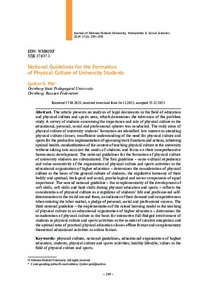Показать сокращенную информацию
Notional Guidelines for the Formation of Physical Culture of University Students
| Автор | Pak, Lyubov G. | en |
| Автор | Пак, Л. Г. | ru_RU |
| Дата внесения | 2024-02-16T06:27:13Z | |
| Дата, когда ресурс стал доступен | 2024-02-16T06:27:13Z | |
| Дата публикации | 2024-02 | |
| URI (для ссылок/цитирований) | https://elib.sfu-kras.ru/handle/2311/152600 | |
| Аннотация | The article presents an analysis of legal documents in the field of education and physical culture and sports area, which determines the relevance of the problem study. A survey of students concerning the importance and role of physical culture in the educational, personal, social and professional spheres was conducted. The risky areas of physical culture of university students’ formation are identified: low interest in attending physical culture classes; insufficient understanding of the need for physical culture and sports for the productive implementation of upcoming work functions and actions, achieving optimal health; standardization of the content of teaching physical culture at the university without taking into account the needs of students and focus on their comprehensive harmonious development. The notional guidelines for the formation of physical culture of university students are substantiated. The first guideline – socio-cultural expediency and value normativity of the organization of physical culture and sports activities in the educational organization of higher education – determines the consideration of physical culture as the basis of the general culture of students, the regulative harmony of their bodily and spiritual, biological and social, psychological and motor components of equal importance. The second notional guideline – the complementarity of the development of soft skills, seft skills and hard skills during physical education and sports – reflects the consideration of physical culture as a regulator of students’ life and professional self- determination in the world around them, an indicator of their demand and competitiveness when entering the labor market, a pledge of personal, social and professional success. The third notional guideline – the implementation of the mixed learning model in the teaching of physical culture in an educational organization of higher education – determines the consideration of physical culture as the basis for interactive full-fledged involvement of students in physical culture and sports activities in the context of creative integration and the optimal ratio of practical physical education classes offline format and complementary theoretical educational activities in online format | en |
| Аннотация | В статье представлен анализ нормативно-правовых документов в сфере образования и области физической культуры и спорта, обусловливающий актуальность изучения поставленной проблемы. Проведен опрос студентов о значимости и роли физической культуры в образовательной, личной, социальной и профессиональной сферах. Определены рискогенные области формирования физической культуры студентов вуза: низкая заинтересованность в посещении занятий по физической культуре; недостаточность осмысления необходимости занятий физической культурой и спортом для продуктивного осуществления предстоящих трудовых функций и действий, достижения оптимального состояния здоровья; стандартизация содержания преподавания физической культуры в вузе вне учета потребностей студентов и направленности на их всестороннее гармоничное развитие. Обоснованы смысловые ориентиры формирования физической культуры студентов вуза. Первый ориентир – социокультурная целесообразность и ценностная нормативность организации физкультурной и спортивной деятельности в образовательной организации высшего образования – определяет рассмотрение физической культуры как базиса общей культуры студентов, регулятива гармонии их телесного и духовного, биологического и социального, психологического и двигательного компонентов в равноценной значимости. Второй смысловой ориентир – комплементарность развития soft skills, sеft skills и hard skills в ходе занятий физической культурой и спортом – отражает рассмотрение физической культуры как регулятива жизненного и профессионального самоопределения студентов в окружающем мире, индикатора их востребованности и конкурентоспособности при выходе на рынок труда, залога личностной, социальной и профессиональной успешности. Третий смысловой ориентир – реализация модели смешанного обучения в преподавании физической культуры в образовательной организации высшего образования – обусловливает рассмотрение физической культуры как базиса интерактивного полноценного вовлечения студентов в физкультурную и спортивную деятельность в контексте созидательной интеграции и оптимального соотношения практических физкультурных занятий офлайн-формата и дополняющих их теоретических мероприятий просветительского характера в онлайн-формате | ru_RU |
| Язык | en | en |
| Издатель | Journal of Siberian Federal University. Сибирский федеральный университет | en |
| Тема | physical culture | en |
| Тема | notional guidelines | en |
| Тема | educational organization of higher education | en |
| Тема | students | en |
| Тема | physical culture and sports activities | en |
| Тема | healthy lifestyle | en |
| Тема | values in the field of physical culture and sports | en |
| Тема | физическая культура | ru_RU |
| Тема | смысловые ориентиры | ru_RU |
| Тема | образовательная организация высшего образования | ru_RU |
| Тема | студенты | ru_RU |
| Тема | физкультурная и спортивная деятельность | ru_RU |
| Тема | здоровый образ жизни | ru_RU |
| Тема | ценности в области физической культуры и спорта | ru_RU |
| Название | Notional Guidelines for the Formation of Physical Culture of University Students | en |
| Альтернативное название | Смысловые ориентиры формирования физической культуры студентов вуза | ru_RU |
| Тип | Journal Article | en |
| Контакты автора | Pak, Lyubov G. : Orenburg State Pedagogical University Orenburg, Russian Federation; lyubov-pak@mail.ru | en |
| Контакты автора | Пак, Л. Г.: Оренбургский государственный педагогический университет Российская Федерация, Оренбург | ru_RU |
| Страницы | 299–309 | ru_RU |
| Журнал | Журнал Сибирского федерального университета. 2024 17(2). Journal of Siberian Federal University.Humanities & Social Sciences 2024 17(2) | en |
| EDN | WXBQXF |

